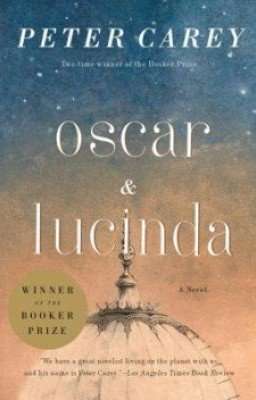Oscar & Lucinda by Peter Carey, Review: Something special
Oscar & Lucinda won Australian author Peter Carey the 1988 Booker Prize and the 1989 Miles Franklin Award. It was shortlisted for The Best of the Booker.
 Oscar & Lucinda Synopsis
Oscar & Lucinda Synopsis
A young Anglican minister who looks like a scarecrow, thinks like an angel, and gambles like the devil;
a teenage Australian heiress who buys a glass factory to help liberate her sex;
a fanatical fundamentalist who is a famous marine artist and biologist;
a Sydney bookkeeper who viciously leads an expedition to transport a glass church through the wilds of the Outback
… these are but a few of the brilliantly drawn, all-too-human misfits Peter Carey employs to tell his masterful story of the very strange turns that love and commerce, religion and colonialism took in the Victorian age.
Genre: Literature, Historical, Romance, Drama, Action-Adventure
Disclosure: If you click a link in this post we may earn a small commission to help offset our running costs.
BOOK REVIEW
After reading my first Peter Carey novel, Bliss, some years ago and not being enamoured, I had been somewhat reticent about giving Peter Carey another spot on my TBR pile. But I am so glad I took NancyO’s advice to give him another chance and read this novel. I would have missed out on something truly special if I had not.
In the Man Booker Prize-winning Oscar & Lucinda, Peter Carey casts an Alice in Wonderland type spell on readers with quirky characters and the outlandish situations they find themselves in.
Characterization
Peter Carey has a real knack for original character descriptions, both physical and psychological:
Oscar was not told about the Christmas pudding, but he knew. He did not let himself know that he knew. Yet the knowledge thrust deep into his consciousness. It was a shaft of sunlight in a curtained room. Dust danced in the turbulent air. Nothing would stay still.
and
There was, in Lucinda Leplastrier, she who became known as the “Glass Lady”, a sense of containment, of order, a ‘clean starched stillness’. But the stillness was coiled and held flat. Like a rod of ebony rubbed with cat’s fur, she was charged with static electricity.
The intriguing similes and descriptive sequences created imagery as vivid as watching a film. I have not seen the movie version of this novel, but it comes as no surprise to me that it was made.
Concentration required
My only slight criticism would be that Peter Carey’s prose requires some concentration to read. He has a habit of veering off into tangents or providing caveats mid-sentence, as though his mind is bursting with too many ideas. And although that writing style left me frustrated and at times confused when reading Bliss, it somehow seemed quite in keeping with the Oscar & Lucinda storyline. This style actually conveyed beautifully the inner turmoil the lovable but hapless characters in this novel experience.
I have great admiration for the eccentric mind that crafted this wonderful story. The characters and their plights will stay with me long after reading.
This is a story to fall into. When you read it (and you should) I recommend you set aside some time to become lost in the world of Peter Carey’s Oscar & Lucinda. This is one I did not want to end.
BOOK RATING: The Story 5 /5 ; The Writing 4.5 / 5 — Overall 4.75
Get your copy of Oscar & Lucinda from:
Book Depository Booktopia AU Amazon Bookshop US
OR listen to the audiobook FREE with Audible’s Trial (check eligibility)
About the Author, Peter Carey
Peter Carey is an Australian author. He has won the Man Booker Prize twice and the Miles Franklin Award three times, and received shortlisting for other titles in his catalogue for both awards. Check out Peter Carey’s official website.
Watch the Oscar and Lucinda movie trailer, featuring Ralph Fiennes and Cate Blanchett:
Source: IMDb
More captivating historical fiction:
A Room With A View by EM Forster / The Importance of Being Earnest by Oscar Wilde / Grand Days by Frank Moorhouse / The Swan Thieves by Elizabeth Kostova / Transatlantic by Colum McCann




